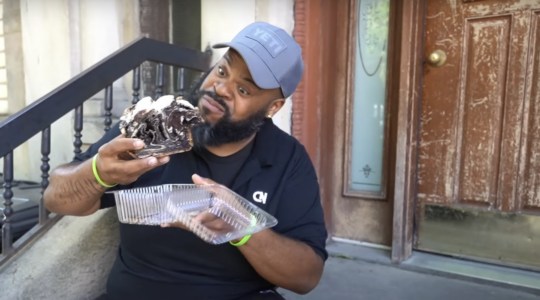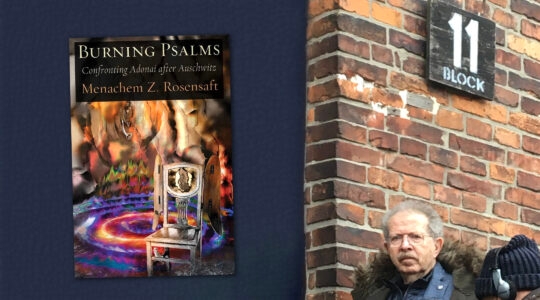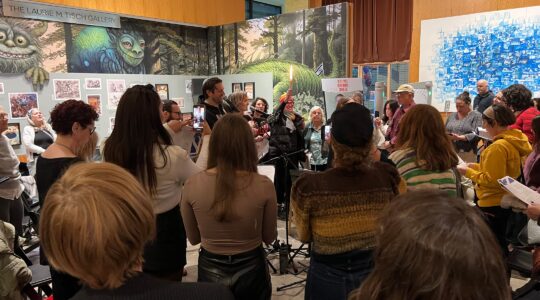As Michael Kaplan passed the crowds at Ground Zero Monday, less than 24 hours after President Barack Obama announced that U.S. forces had killed Osama bin Laden, he had “the distinct feeling that the celebration was bittersweet,” he told The Jewish Week.
“There was some sense that justice had been served,” said Kaplan, who has worked in the Financial District for 30 years and still recalls 9/11 “every time I look out the [office] window.” But he also sensed sorrow among the crowds “for the damage and loss of life” that day.
A financial analyst from Edison, N.J., Kaplan not only works close to Ground Zero — “about a half-mile as the crow flies” — but worships in the area, too, attending daily services at the Wall Street Synagogue. The Orthodox shul, located on Beekman Street, has the distinction of being the closest synagogue to the site of the former World Trade Center.
By virtue of those facts, Kaplan believes that he, like others directly affected by the attack, may have received Sunday’s news differently from those who weren’t near Ground Zero on 9/11 or hadn’t lost cherished friends or family members. Whatever elation he may have felt on hearing the news, he said, was “moderated by the scope of the tragedy.”
Whether or not those feelings are borne out, reactions to Sunday’s operation differed, at least slightly, between those associated with the Wall Street Synagogue and a half-dozen people interviewed Monday night outside the Jewish Community Center in Manhattan on the Upper West Side. The synagogue attracts mainly Modern Orthodox and chasidic Jews during the day, people who work in the financial world or at nearby electronics stores like J&R Music and Computer World, while the JCC draws many of its members from its neighborhood, often considered as among the most liberal in the city.
Leaving the JCC after attending a meditation program, one of several activities there Monday night, two women expressed satisfaction that the action was ordered by Obama and may, in fact, benefit him politically as a result.
“I was really happy that it happened on Obama’s watch,” said Marilyn Penrose, a recreational therapist, who said she was tired of so many conservatives “trying to trash” the president. “I’m thrilled. I’m kvelling.”
Her friend, Judy Schwartzman, agreed, calling the operation’s success a “‘Yes, We Can’ moment,” a reference to one of Obama’s campaign slogans. The news was “totally unexpected,” providing a contrast to the many years in which Americans expected nothing to happen, said Schwartzman, who has worked in both politics and government. This, she added, is “something to be proud of.”
Two other women, leaving a movie about the Holocaust, shared those views. Adele Berk, now retired, said she was happy for the soldiers but especially happy for Obama, who achieved a “victory” this weekend. Eileen Sharaga, a career counselor, said she felt the outcome could represent “a good turn of events” for the president.
Politics aside, though, the four women also discussed whether Sunday’s action left them feeling safer and, in Penrose’s case, spoke of the memory of a close friend who died at Ground Zero.
Removing bin Laden may have been little more than “symbolic,” said Berk, expressing what seemed to be the consensus on that score. “He may be replaced by someone just as evil and just as capable of carrying out terrorism.”
Nearly everyone outside the JCC also agreed that killing bin Laden doesn’t mean closure for people who lost friends and family members.
In comments like those, the JCC members and Kaplan appeared to share common ground.
Kaplan said bin Laden’s death doesn’t make him feel any safer, noting that there’s still “other people in the world looking to kill us. Even if it impairs al Qaeda’s ability to harm people,” he added, “it wouldn’t necessarily impair the ability of other organizations to cause harm.”
Meanwhile, Rabbi Meyer Hager, the spiritual leader of the Wall Street Synagogue for the past 25 years, sees the hand of God in the latest development.
Bin Laden “was taken out on the very day that we remember the Shoah,” Rabbi Hager said. “It’s not a mere coincidence, but evidence of a Divine plan … to avenge the souls that bin Laden destroyed on that very day.”
The Wall Street Synagogue lost some of its members and friends that day, including four firefighters from the fire station neighboring the shul. Like other buildings in the vicinity, it also served as a refuge for people escaping the destruction and sustained damage from soot and ash.
He and his congregants recalled those days on Monday morning, the rabbi said, adding to the feeling of “general elation that, finally, the country had done something” to avenge the loss of so many people. But he didn’t feel jubilant, he said, “because there were too many sorrowful thoughts going through my mind.”
The New York Jewish Week brings you the stories behind the headlines, keeping you connected to Jewish life in New York. Help sustain the reporting you trust by donating today.




